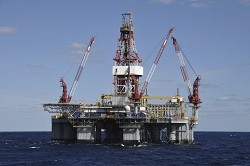The Obama administration has proposed to open the Atlantic and Arctic Oceans to oil and gas drilling as part of the 2017-2022 Outer Continental Shelf Oil & Gas leasing program. The Atlantic Outer Continental Shelf (OCS) has been off-limits to oil and gas drilling since 1982, thanks to congressional and presidential orders. If the Atlantic and Arctic OCS are opened for oil and gas exploration, it would be hazardous for our natural systems, the economy, and the climate.
Offshore oil and gas drilling is inherently a dirty and dangerous business. This April will mark five years since the worst environmental disaster in our nation’s history. The explosion itself took 11 lives and resulted in the longest-lasting and most-voluminous spill in history. In 2010 between April 20 and July 15, 4.9 million barrels, (over 200 million gallons) of crude emptied directly from the well source into the Gulf of Mexico.
Leaks can often go undetected in offshore wells. The Bureau of Ocean Energy Management estimates that well over 500,000 barrels of oil have leaked into American waters in the past 45 years, unreported.
The economic impacts of an oil spill off of the Atlantic and Arctic coasts would devastate tourism and fisheries; similar to the hazardous effects of the Deepwater Horizon spill in 2010 and the Exxon Valdez spill in 1989. Fishing, tourism, and recreation add tens of thousands of jobs and billions of dollars to the gross domestic product (GDP) of each coastal state.
Another hazard of offshore drilling is that seismic airgun testing must first be conducted to assess where oil and gas deposits are located. Seismic airguns harm wildlife, especially marine mammals that depend on sound to navigate. In the Atlantic, it could injure 138,500 dolphins and whales, and cause 13.5 million disruptions to the vital behaviors of marine mammals such as feeding, calving, and breeding.
Luckily the public has spoken up and has submitted over 200,000 public comments against drilling in the Atlantic and 725,000 against drilling in the Arctic. Drilling in the Atlantic could release almost 4 billion tons of carbon pollution. That is equivalent to the pollution from more than 831 million cars.The Arctic Ocean oil deposits are a huge potential source of new carbon emissions that could generate as much as 15 billion tons of new carbon dioxide pollution. Scientists have made it clear that two-thirds of known remaining fossil fuels must stay in the ground -- including all of the dirty fuels in the Arctic -- to avoid the worst consequences of climate disruption.
President Obama has gone to great lengths to combat climate disruption, and even raised the Corporate Average Fuel Economy (CAFE) standards, helping Americans go farther on a gallon of gas. Opening the Atlantic OCS would negate two-thirds of the pollution savings from the president’s new fuel-economy standards. In the Arctic, it would emit 2.5 times more carbon than the savings from the new CAFE standards.
It would take between 15 and 20 years for the new wells to come online and begin producing energy. During that same time, we could be producing clean and renewable wind power from our coasts. “In the next 20 years, offshore wind could create about 91,000 more jobs than offshore drilling (about double the job creation potential of offshore oil and gas). A modest and gradual development of offshore wind on the East Coast over the next 20 years could generate enough energy to power over 115 million households,” according to a report by Oceana.
It is time for the president to listen to the public and not allow offshore oil and gas development in the Atlantic and Arctic Oceans. The dirty legacy of offshore drilling threatens to undermine the progress he has made with his climate action plan. We must protect our coasts as well as our climate, from the further development of fossil fuels. The only way to avoid the worst effects of climate disruption is to keep our dirty fuels in the ground. It is time for the Obama administration to remove the Atlantic and Arctic OCS from the proposed five-year leasing program and build a stronger and cleaner economy with offshore wind energy.
